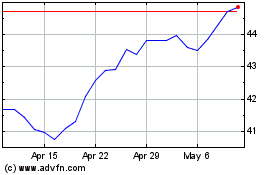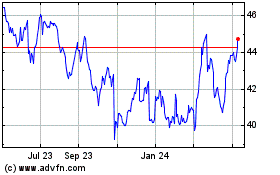By Tripp Mickle
The U.S. government issued a tough set of rules for the
e-cigarette industry on Thursday that included banning sales to
anyone under 18, requiring package warning labels, and making all
products -- even those currently on the market -- subject to
government approval.
In an action e-cigarette makers had been dreading, the Food and
Drug Administration said it was assuming regulatory authority over
e-cigarettes.
Though the product-approval process will be phased in during
three years, that will be little solace to the fledgling but
fast-growing $3.5 billion industry that has, until Aug. 8 when the
rules take effect, largely been unregulated and dominated by small
manufacturers and vape shops.
The most troubling measure for e-cigarette industry players is
the FDA approval process. Many of the small vape shops, device
manufacturers and liquid nicotine producers are concerned that they
won't be able to afford the FDA's approval process, which could
cost anywhere from $2 million to $10 million per item, according to
the regulatory consulting company SciLucent LLC.
"This is going to be a grim day in the history of tobacco-harm
reduction, " said Greg Conley, president of the American Vaping
Association, an industry-funded advocacy group. "It will be a day
where thousands of small businesses will be contemplating whether
they will continue to stay in business and employ people."
A spokesman with Altria Group Inc., the nation's largest tobacco
company, voiced similar concerns about the FDA's product approval
requirements. He said the company wants Congress to pass laws
addressing that issue, among others.
Many fear that now that FDA has assumed regulatory oversight, it
is likely to move forward with other rules related to the
devices.
In June, the agency proposed requiring warning labels and
child-proof packaging because of an increase in nicotine exposure
and poisoning incidents among young people. The FDA could move to
regulate advertising or flavors such as cotton candy and watermelon
that might appeal to youth.
"We're looking at the flavor issue with e-cigarettes," said FDA
Tobacco Center Director Mitch Zeller during a news conference.
Later Thursday, he said the agency was aware of "anecdotal
reports" that e-cigarettes have helped smokers kick their habit,
but those benefits were outweighed by concerns about youth using
the devices.
In addition to e-cigs, the FDA said it would be taking
regulatory authority over other tobacco products, including cigars,
pipe tobacco and water-pipe tobacco.
The FDA has been regulating cigarettes since Congress granted it
oversight of traditional smokes with the 2009 Family Smoking
Prevention and Tobacco Control Act.
"Today's announcement is an important step in the fight for a
tobacco-free generation -- it will help us catch up with changes in
the marketplace, put into place rules that protect our kids and
give adults information they need to make informed decisions,"
Department of Health and Human Services Secretary Sylvia Mathews
Burwell said in a statement.
Most researchers agree that e-cigarettes are less harmful than
cigarettes because, unlike cigarettes, they don't combust.
Studies have shown that when traditional cigarettes combust they
release more than 60 carcinogens. But the long-term effects of
using the electronic devices remain largely unknown, and many
anti-tobacco groups and public-health officials are concerned they
could become a gateway to traditional smoking.
Under the new rules, e-cigarette manufacturers would have up to
two years to continue to sell their products while they submit an
application to the FDA. They would have one additional year to sell
the product during the FDA's review, which it estimates will cost
$285,000 to $2.6 million and take 1,713 hours per application.
The approval process is expected to be less damaging for major
tobacco companies such as Altria, Reynolds American Inc., and
Imperial Brands PLC that have launched their own versions of the
battery-powered devices that heat nicotine-laced liquid into a
vapor. Those companies have financial resources to cover the costs
that many vape shops and liquid nicotine manufacturers lack.
Independent vape shops and liquid nicotine manufacturers are
hoping Congress will preserve an amendment by Rep. Tom Cole (R.,
Okla.) that was attached to the House fiscal 2017 agriculture
appropriations bill that would allow e-cigarette products on the
market today to remain there without going through the FDA's
so-called premarket approval process.
Those products still would have to abide by FDA rules but could
be subject to a "substantially less onerous" approval process, Mr.
Cole's office said.
It took the FDA two years to finalize its rules, a lengthy
period that helped fuel concerns about the health risks of
e-cigarettes and underage use of the largely unregulated devices.
The wait triggered criticism from anti-tobacco groups and lawmakers
and contributed to a sharp decline in e-cigarette sales.
Concerns escalated when a study published in August by the
Journal of the American Medical Association found ninth-graders who
used e-cigarettes were 2 1/2 times as likely as peers to have
smoked traditional cigarettes a year later. The Centers for Disease
Control and Prevention reported in April that e-cigarette use
tripled among U.S. teenagers in 2014.
As the agency deliberated, the e-cigarette industry swelled to
an estimated $3.5 billion in sales from $2 billion, according to
Wells Fargo.
The promise of a less harmful nicotine product drew interest
from private-equity firms and big-name investors such as Silicon
Valley entrepreneur Sean Parker, who invested in NJOY Inc. in
2013.
Tobacco companies including Altria and Japan Tobacco Inc. later
bought independent e-cigarette makers such as Green Smoke and
Logic.
Wells Fargo tobacco analyst Bonnie Herzog, who has hosted
several e-cigarette conferences, said the rule would "stifle
innovation, which could dramatically slow industry growth" and
discourage consumers from switching to e-cigarettes.
--Tom Burton contributed to this article.
Write to Tripp Mickle at Tripp.Mickle@wsj.com
(END) Dow Jones Newswires
May 06, 2016 02:48 ET (06:48 GMT)
Copyright (c) 2016 Dow Jones & Company, Inc.
Altria (NYSE:MO)
Historical Stock Chart
From Mar 2024 to Apr 2024

Altria (NYSE:MO)
Historical Stock Chart
From Apr 2023 to Apr 2024
